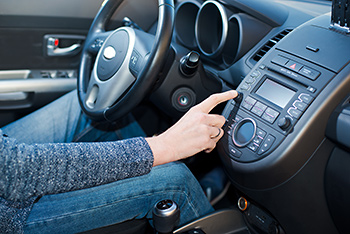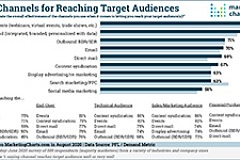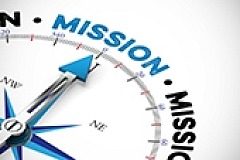 With social media on the rise, should you still be depending on radio advertisement as a marketing strategy to promote your business? You may be surprised.
With social media on the rise, should you still be depending on radio advertisement as a marketing strategy to promote your business? You may be surprised.
In the era of TV, Netflix, and social media, it would be easy for business owners to dismiss radio advertising for what they think are younger, greener advertising markets. But radio is far from dead, and skipping out on radio advertisement cuts a business out of a hugely profitable advertising area.
[quotesright]In fact, 92 percent of consumers ages 12 and older listen to radio every week. [/quotesright] And, radio platforms now include a much broader range of listening options than traditional stations alone.
Still not sold? Here's why you shouldn't dismiss radio advertisement as an evergreen tool for sustainable business growth, and why you need to get in on the market.
Listening Statistics of Radio Advertisement
Over 90 years after its introduction to the world, radio has a broader reach than ever.
While a portion of the radio listening audience tunes into digital stations, the majority of listeners – approximately 54 percent – still tune into AM/FM radio regularly. Approximately 82 percent of all consumers listen to the traditional radio stations at least once a week.
Think about that for a second. [quotes]Over three-quarters of all consumers are still listening to the radio.[/quotes] And, radio's performance among individual age demographics is even higher.
Among the various age demographics, radio's average weekly reach hovers around 90 percent for each individual group. That's 90.9 percent for ages 12+, 90.4 percent for ages 18-34, 93.2 percent for ages 25-54, and 86.4 percent for ages 65+. It also reaches an average of 90 percent of men and women for all age demographics 12-65+.
Like we said, radio is anything but dead.
Why? Radio still has a strong sway over another great technological advancement where TV is still struggling to play catch up: the automobile. It's the same place radio has had a stronghold for decades, the place where many consumers grew up listening to favorite local personalities, or to the news and sports.
It has also succeeded in branching to a wider audience beyond traditional stations, a feat many other mediums have struggled with.
The Diversified Radio of Today
[quotesright]Unlike print media, radio remains vibrant and is rapidly evolving into a profitable digital space with a range of platforms to grow into. [/quotesright]
Traditional radio was first challenged in the 40s and 50s by the television and while a few stations closed, radio stayed strong with new content formats and stereo signals.
Today, radio can encompass a broad range of media platforms including streaming services like Pandora, Spotify, and SiriusXM as well as podcasts and music channels on TV.
In other words, digital media hasn't replaced radio listening, but rather enhanced it.
Consider, for example, the podcast, which has enabled content to be saved and heard well beyond the bounds of the original broadcast. Specifically, consider the BBC Radio show by film reviewers Mark Kermode and Simon Mayo.
Their small radio show in the UK grew to a global audience thanks to the podcast. In 2005, the original podcast had only 42 downloads. As of 2013, downloads numbered around 150,000. Remember, every time listeners tune in, they are hearing all the ads that were on the original broadcast.
As of 2013, one-third of Americans said they had listened to podcasts. That's no small number of people, but it's only a sliver of radio's total reach.
Local Reach
For businesses interested in radio advertisement, the available market is massive – and covers both local and national audiences. [quotesright]That equals two critical types of available recognition in one thriving medium. [/quotesright]
People also consume radio differently than TV, to the benefit of advertisers. Here's why that is.
The Hyperlocal Benefit
Radio advertisement allows businesses to focus their advertisements on a specific audience without necessarily requiring the listener to be in one specific location to hear it. That is, listeners can tune in driving, on their phones, at work, the gym – the possibilities are enormous.
This allows a company, even a national one, to establish a local reputation that is invaluable for growing a customer base. Why? Because when your business has local recognition attached to a brand voice, it means your radio consumers are more willing to trust you and buy from you.
[quotes]Radio also allows advertisers to join a market that is largely receptive to them.[/quotes] To this end, 91 percent of consumers agree with the statement: Advertising on the radio provides me with useful information about bargains. The majority also disagree with the notion that radio advertising has no credibility.
Specifying your target audience also makes it easy for advertisers to maximize the benefit of a radio advertisement by maximizing on customer interests.
A restaurant, for example, can look to advertise on a station that specializes in food, drink, or local restaurants, and that station would have demographic information about the target audience the restaurant should reach. [quotesright]They also reach those demographics, so advertising with them will attach your brand to a station they already enjoy. [/quotesright]
Listeners are also loyal to local radio stations for live broadcasts and familiar, hometown radio personalities. Consumers like to buy local, which means when they hear a local radio advertisement associated with a radio personality they trust, they're more likely to connect with it.
Why? Because they feel their money is supporting their neighbors and local economy – in other words, their friends and family, the familiar faces they see every day. Good news for your business.
Listening Alone Benefit
[quotes]People also consume radio differently than they consume TV – once again, to the advertiser's benefit.[/quotes]
When watching TV, audio information is matched with visual information. This means a consumer has to be directing more of their attention to receive the full benefit of the TV ad when the savvy marketer knows they're more likely to be annoyed by the ad.
With radio, listeners can consume information while doing other things, which means they're still processing your ad even if they aren't directing all of their attention to it. Being able to listen also allows consumers to hear the radio in more diverse settings – at work, at the gym, shopping, etc.
This means that the chances of someone listening alone are higher. A person listening alone is less likely to be doing other things, like holding a conversation, that would distract them from fully processing and thinking about the ad. Thinking about the ad means retaining the information.
Retained information equals advertising dollars well spent.
Listener Retention
Remember in biology, when your science teacher told you your brain is more active staring at a blank wall than watching TV? It is true that while the visual areas of the brain are highly stimulated by TV, the rest of the brain is firing without processing information.
Here, radio has the upper hand over other media formats precisely because it isn't consumed visually. [quotes]Listening, unlike watching, isn't a passive activity.[/quotes] Our brain is working to process auditory information while matching it with visual associations based on what we hear.
In other words, radio consumption is far more active than other forms of media. So your ad isn't just getting in front of customers – your customers are processing it.
ROI
[quotesright]While the average viewer only spends about 10 to 20 seconds on a webpage, the average radio advertisement is 30 to 60 seconds. [/quotesright] That's a gold mine when we know that consumers are actively listening.
Besides this is the fact that radio offers a huge repetition benefit. As soon as a radio station plays your ad, anyone listening to radio has to hear it, and they'll hear it several times if they're a regular listener.
This works to the benefit of radio advertisers because listeners are actively hearing your ad and hearing it repeatedly. Not only do they hear your ad, they recognize it and remember it. That's a critical threshold in getting consumers to buy.
[quotes]Compare this to the fact that a radio advertisement is less expensive to produce than a TV advertisement.[/quotes] Radio, after all, is only concerned with sound. The cost of maintaining a running radio commercial is also much lower than TV.
In a 2015 study, Nielsen Catalina Solutions found that the overall average payback for radio advertising was 6.21x and as high as 23.21x (rare) but even half that is impressive.
Knowing all of this, the ROI for radio advertisement is high. Sure, there are younger mediums, but for a proven record of success, there's nothing quite like radio.
Things You Should Know
It’s important to understand your target market: Is it a niche product used by a tiny sliver of people or is it used by a large and generally identifiable group? For example, consider the difference between people who only consume African sourced vegan food and people who go out to eat.
Surprisingly, if you have a valuable product or service that is not easily identifiable to a narrow group you can reach efficiently, radio can reach vast audiences cost effectively and let the interested users self-select and contact you.
[quotesright]You need to set realistic and specific goals for your ad campaign and track your results.[/quotes] What do you want people to do as a result of hearing your ad? Go to a website? Call? Drop into your store? Make it simple and give people a reason to act now. How will you know the ad was the reason they acted?
Poorly produced ads generally deliver poor results. Doing a good commercial is not easy, you’ll also need a great script and a skilled voice-over artist to end up with an ad that delivers.
How Do You Get Your Ad Created?
You can let a radio station to produce your ad with their in-house team. Just be aware that the local station may not have the skills to produce an ad that delivers. You’ll also be depending on them to recommend the times and ad packages.
Your alternative is to use independent contractors or consultants. Upwork.com is a good place to find great talent that can do the job. If you Google “radio ad agency” you’ll find dozens of professionals who can not only turn out a great ad but also buy ads at times and stations at a lower cost than you.
Like everything else, what you’ll likely get out of advertising on radio is proportional to the effort and quality of thought and talent you put into it.
Grow Your Business, Smarter
If you're a business owner looking to grow without considering radio advertisement, it's time to start thinking about how productively you're using your advertising dollars.
You also need to think about how to use radio to grow your business the right way.
If you're turning to radio asking how you can grow your business faster, you're asking a popular question. Trouble is, you may also be asking the wrong one if you want to create sustained growth and more sales. Often, businesses try to use ads to generate sales to cover up problems that are the underlying reasons the company needs more sales. The benefits of radio will be greatest if you first ask yourself the right questions for your business.
Not sure where to start? Check out our list of the questions you should be asking about your business and what they tell you about your underlying business problems.
Think you've got those questions answered? You could be maximizing your business performance further. Check out our six ways to maximize your business performance.
We're here to help your business perform better – whatever your advertising medium of choice. Subscribe to our newsletter for several great ideas to help your business thrive the smart way – simply click the subscribe button at the top of the page, you can opt-out anytime with one click.














